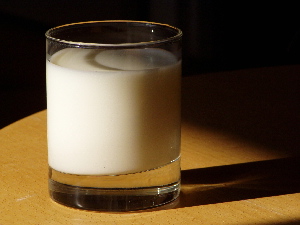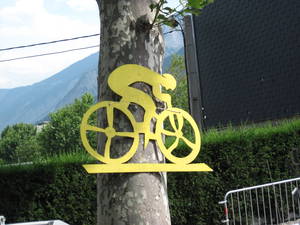Eating for Energy and Recovery
Interview with
Meera: - Carbohydrates are the key nutrient during a Race. But what's the ranking of other nutrients? Plus, could the diet be controlled as a preventative measure to protect our bodies as well? Meera caught up with team nutritionists Mark Quod and Matt Rabin in the riders' area before stage 10 of the tour. And Mark began by explaining the ranking of nutrients after the crucial carbohydrates...
Mark: - After the race, protein; they're out there on the bike for so long, you're going to get some muscle degradation so to maintain protein balance throughout the 3-week race, those proteins are very important. And of course, fats are important for various other body functions as well, so that's the general order.
Meera: - And what about the timings of when they should eat? So now, this is stage 10. The race is in about an hour. What have they eaten this morning and is there meant to be a certain gap? ![Pasta and Pesto (c) [http://www.flickr.com/people/pgoyette/ Paul Goyette]</p><p> Pasta and Pesto](/sites/default/files/media/Pasta_with_pesto.jpg)
Mark: - Yeah, the guys have a protocol of when they eat in the morning. First, they get up and have some breakfast then an hour or so later to have a race meal with rice and pasta and things like that. Now, just an hour before the race, they also have liquid meals that have carbohydrates, proteins, and fat in certain quantities, so they're well and truly loaded, and ready to go for the race.
Meera: - Now moving over to you Matt, the cyclists here are on a non-gluten diet, so gluten-free. Why is that important?
Matt: - We implemented that in around 2008, just because we looked at foods which are more difficult to digest, more difficult to assimilate. We noticed that some people had an issue with gluten. Since we've implemented it, we found that guys don't get so bloated when they eat certain foods, so that typically means leaving bread for example out of the diet, but we have also removed many other sorts of simple foods which typically can cause irritation and are harder to digest.
Meera: - Such as?
Matt: - Such as dairy for example. So, we gave a plan to our chef at the start of the  tour, and he knows exactly what our protocols are as related to foods that we want to try and eliminate, and the foods we want to try to replace them with.
tour, and he knows exactly what our protocols are as related to foods that we want to try and eliminate, and the foods we want to try to replace them with.
Meera: - And you also deal with, say, recovery foods. So you know, cyclists, they're greatly using their muscles, they're obviously exhausted after races. So, what's the road to recovery diet wise?
Matt: - These days in cycling, you got 16 hours say, from when they get on the bike to when they got on the bike the next day. With that in mind, we sort of looked at the guys' simple blood values and things that some of the riders might have intolerances with or allergies against, so we just try and remove those from the diet. That allows the body to assimilate and digest a lot better without irritation and allow them sort of recover better ultimately.
Meera: - Inflammation is the key thing, isn't it?
Matt: - The foods that we sort of try and promote if you like are of an anti-inflammatory nature. Cellular inflamation is going to affect everything that a rider does because the body is under stress all day, 4, 5, 6 hours a day on the bike, that is going to create inflarmation. So, anything we can do to sort of stop that in between stages are going to be of benefit for their performance. So the less inflamation you have and the more we can get that under control, the better they're going to perform.
Meera: - How would you even go out testing this? How would you know who's more inflamed than others?
Matt: - Every quarter, we measure some simple blood parameters such as the arachidonic acids in the blood and the ecopentaenoic acid in the blood, so that's AA and EPA in the blood. And we look at these ratios to tell us how inflamed their bodies are at any given time. From that, we can modify their diet and give them the instructions to modify their diet. So the guys that have been on the team for 2 or 3 years, I mean, they're familiar with these tests, what they mean and how to implement them in order to get the best recovery.
get the best recovery.
Meera: - And just lastly then I guess. If there was one key tip when it comes to diet, what should be remembered by cyclists?
Matt: - For me, I would say that the recovery is a massive aspect and so, carbs are king during racing, but it's getting the protein in post stage is really, really important. So, on the bike; carbohydrates, recovery; think protein.
Meera: - Nutritionists, Matt Rabin and before that, Mark Quod from team Garmin-Transitions.
- Previous Eating your way to Endurance
- Next The Views of a Sprint Cyclist









Comments
Add a comment